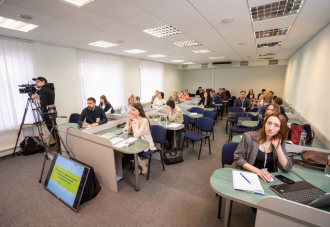This week, Mentorship Program 3.0 participants learned how to qualitatively state problems for further resolution, as well as what tools to use for local research in the community.
“If the problem concerns only us, nothing will change after we solve it. The more people it will concern, the more support you can get in implementation,” said Olena Matviichuk, an organizational development expert, at the beginning of the training.
With her support, in group exercises, the mentees learned to test the stated problems, discussed the target audiences and the importance of determining their needs for the development of the final product.
“The product is a measurable result that can be seen. In the short term, the product solves the problem, in the long term, it meets the need,” noted Olena Matviichuk.
The next step was the mentee’s meeting with Anastasoia Prokopenko, Executive Director of the Access Point NGO. The expert shared practical tools that help to explore the opinions of community residents. She also told what is important to pay attention to when using these tools so that the research results are as useful as possible for further problem solving.
Such tools include an exploratory walk, “Like-Dislike” (walk with a camera), pending questions, mapping, and modeling.
The training participants also learned when and for what purpose the Problem Tree method is used, as well as how to correctly formulate questions so that obtained research results are true and useful.
The skills and knowledge that the mentees gained this week will be useful in implementing the ideas they have already started working on within the Mentorship Program 3.0.
In the continuation of the first training module, participants of the Mentorship Community will learn about the peculiarities of advocacy and will acquire skills in using inclusion and gender-based approaches in the activities of organizations and local problem solving.
Mentorship Program 3.0 is implemented as part of the Project Ukraine Civil Society Sectoral Support Activity implemented by the Initiative Center to Support Social Action “Ednannia” in partnership with the Ukrainian Center for Independent Political Research (UCIPR) and Centre for Democracy and Rule of Law with the sincere support of the American people through United States Agency for International Development.



